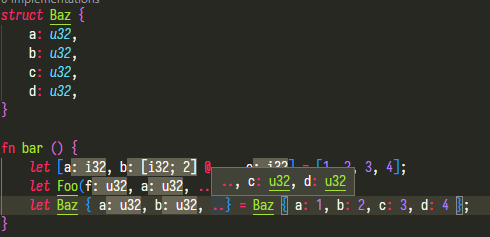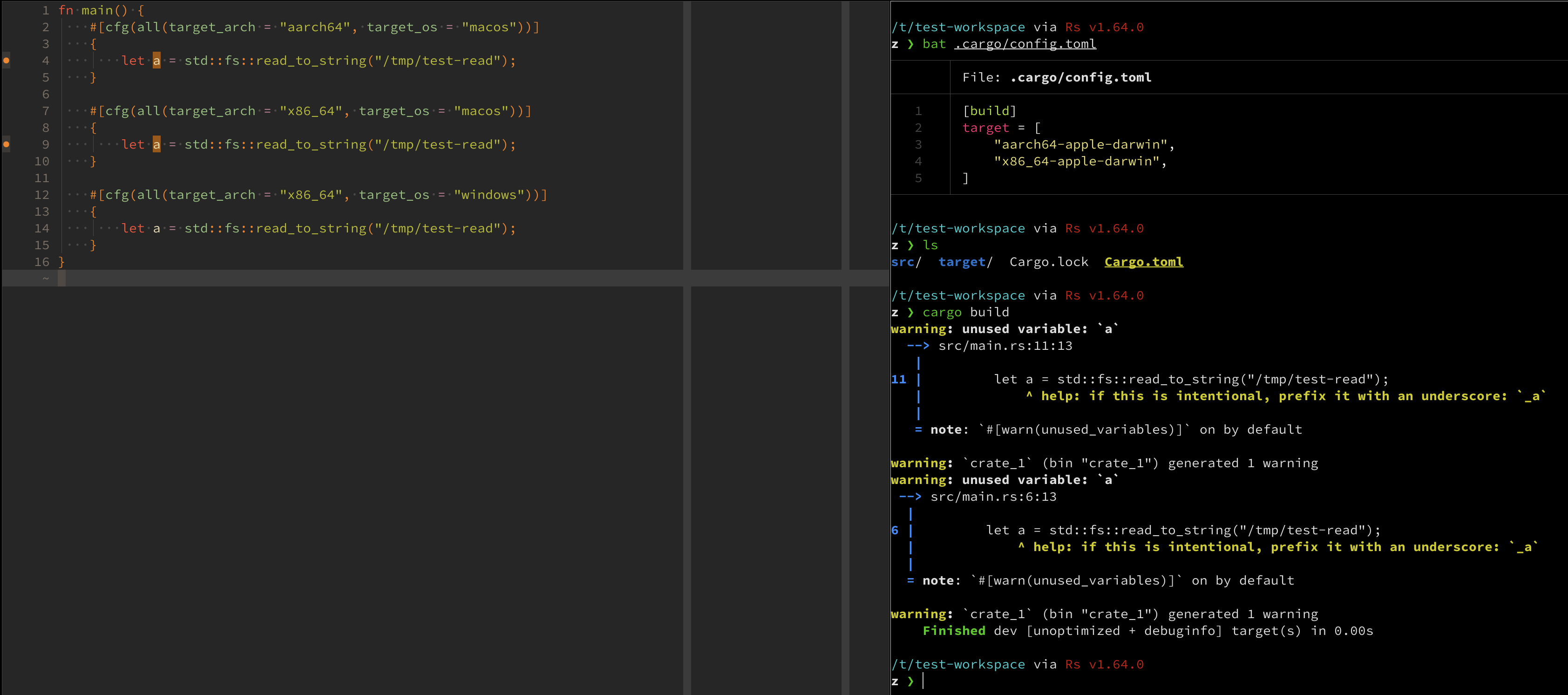The old value was for the old chalk-engine solver, nowadays the newer chalk-recursive solver is used.
The new solver currently uses fuel a bit more quickly, so a higher value is needed.
Running analysis-stats showed that a value of 100 increases the amount of unknown types,
while for a value of 1000 it's staying mostly the same.
Add `move_const_to_impl` assist
Closes#13277
For the initial implementation, this assist:
- only applies to inherent impl. Much as we can *technically* provide this assist for default impl in trait definitions, it'd be complicated to get it right.
- may break code when the const's name collides with an item of a trait the self type implements.
Comments in the code explain those caveats in a bit more detail.
Fix the case where if a user types `&&42.o`, snippet completion
was still applying &&Ok(42). Note this was fixed previously
on `&&42.` but this still remained a problem for this case
Don't show runnable code lenses in libraries outside of the workspace
Addresses #13664. For now I'm just disabling runnable code lenses since the ones that display the number of references and implementations do work correctly with external code.
Also made a tiny TypeScript change to use the typed `sendNotification` overload.
fix: check tail expressions more precisely in `extract_function`
Fixes#13620
When extracting expressions with control flows into a function, we can avoid wrapping tail expressions in `Option` or `Result` when they are also tail expressions of the container we're extracting from (see #7840, #9773). This is controlled by `ContainerInfo::is_in_tail`, but we've been computing it by checking if the tail expression of the range to extract is contained in the container's syntactically last expression, which may be a block that contains both tail and non-tail expressions (e.g. in #13620, the range to be extracted is not a tail expression but we set the flag to true).
This PR tries to compute the flag as precise as possible by utilizing `for_each_tail_expr()` (and also moves the flag to `Function` struct as it's more of a property of the function to be extracted than of the container).
Mega-sync from `rust-lang/rust`
This essentially implements `@oli-obk's` suggestion here https://github.com/rust-lang/rust-analyzer/pull/13459#issuecomment-1297285607, with `@eddyb's` help.
This PR is equivalent to 14 syncs (back and forth) between `rust-lang/rust` and `rust-lang/rust-analyzer`.
Working from this list (from bottom to top):
```
(x) a2a1d9954⬆️ rust-analyzer
(x) 79923c382⬆️ rust-analyzer
(x) c60b1f641⬆️ rust-analyzer
(x) 8807fc4cc⬆️ rust-analyzer
(x) a99a48e78⬆️ rust-analyzer
(x) 4f55ebbd4⬆️ rust-analyzer
(x) f5fde4df4⬆️ rust-analyzer
(x) 459bbb422⬆️ rust-analyzer
(x) 65e1dc4d9⬆️ rust-analyzer
(x) 3e358a682⬆️ rust-analyzer
(x) 31519bb39⬆️ rust-analyzer
(x) 8231fee46⬆️ rust-analyzer
(x) 22c8c9c40⬆️ rust-analyzer
(x) 9d2cb42a4⬆️ rust-analyzer
```
(This listed was assembled by doing a `git subtree push`, which made a branch, and looking at the new commits in that branch, picking only those that were `⬆️ rust-analyzer` commits)
We used the following commands to simulate merges in both directions:
```shell
TO_MERGE=22c8c9c40 # taken from the list above, bottom to top
git merge --no-edit --no-ff $TO_MERGE
git merge --no-edit --no-ff $(git -C ../rust log --pretty=format:'%cN | %s | %ad => %P' | rg -m1 -F "$(git show --no-patch --pretty=format:%ad $TO_MERGE)" | tee /dev/stderr | rg '.* => \S+ (\S+)$' --replace '$1')
```
We encountered no merge conflicts that Git wasn't able to solve by doing it this way.
Here's what the commit graph looks like (as shown in the Git Lens VSCode extension):
<img width="1345" alt="image" src="https://user-images.githubusercontent.com/7998310/203984523-7c1a690a-8224-416c-8015-ed6e49667066.png">
This PR closes#13459
## Does this unbreak `rust->ra` syncs?
Yes, here's how we tried:
In `rust-analyzer`:
* check out `subtree-fix` (this PR's branch)
* make a new branch off of it: `git checkout -b subtree-fix-merge-test`
* simulate this PR getting merged with `git merge master`
In `rust`:
* pull latest master
* make a new branch: `git checkout -b test-change`
* mess with rust-analyzer (I added a comment to `src/tools/rust-analyzer/Cargo.toml`)
* commit
* run `git subtree push -P src/tools/rust-analyzer ra-local final-sync` (this follows the [Clippy sync guide](https://doc.rust-lang.org/nightly/clippy/development/infrastructure/sync.html))
This created a `final-sync` branch in `rust-analyzer`.
In `rust-analyzer`:
* `git merge --no-ff final-sync` (this follows the [Clippy sync guide](https://doc.rust-lang.org/nightly/clippy/development/infrastructure/sync.html))
Now `git log` in `rust-analyzer` shows this:
```
commit 460128387e46ddfc2b95921b2d7f6e913a3d2b9f (HEAD -> subtree-fix-merge-test)
Merge: 0513fc02a 9ce6a734f
Author: Amos Wenger <amoswenger@gmail.com>
Date: Fri Nov 25 13:28:24 2022 +0100
Merge branch 'final-sync' into subtree-fix-merge-test
commit 0513fc02a08ea9de952983624bd0a00e98044b36
Merge: 38c98d1ff6918009fe
Author: Amos Wenger <amoswenger@gmail.com>
Date: Fri Nov 25 13:28:02 2022 +0100
Merge branch 'master' into subtree-fix-merge-test
commit 9ce6a734f37ef8e53689f1c6f427a9efafe846bd (final-sync)
Author: Amos Wenger <amoswenger@gmail.com>
Date: Fri Nov 25 13:26:26 2022 +0100
Mess with rust-analyzer just for fun
```
And `git diff 0513fc02a08ea9de952983624bd0a00e98044b36` shows this:
```patch
diff --git a/Cargo.toml b/Cargo.toml
index 286ef1e7d..c9e24cd19 100644
--- a/Cargo.toml
+++ b/Cargo.toml
`@@` -32,3 +32,5 `@@` debug = 0
# ungrammar = { path = "../ungrammar" }
# salsa = { path = "../salsa" }
+
+# lol, hi
```
## Does this unbreak `ra->rust` syncs?
Yes, here's how we tried.
From `rust`:
* `git checkout -b sync-from-ra`
* `git subtree pull -P src/tools/rust-analyzer ra-local subtree-fix-merge-test` (this is adapted from the [Clippy sync guide](https://doc.rust-lang.org/nightly/clippy/development/infrastructure/sync.html#performing-the-sync-from-clippy-to-rust-langrust), you would normally use `ra-upstream master` but we're simulating things here)
A commit editor pops up, there was no merge conflicts.
## How do we prevent this from happening again?
Like `@bjorn3` said in https://github.com/rust-lang/rust-analyzer/pull/13459#issuecomment-1293587848
> Whenever syncing from rust-analyzer -> rust you have to immediately sync the merge commit from rust -> rust-analyzer to prevent merge conflicts in the future.
But if we get it wrong again, at least now we have a not-so-painful way to fix it.
Improve goto declaration
Closes https://github.com/rust-lang/rust-analyzer/issues/13599
- goto decl now goes to assoc items of trait declarations over the items of trait implementations
- goto decl now goes to the field declaration (opposed to goto def which shows both the field decl and binding created/local being used)
- also adds back the goto definition fallback that seems to have been dropped at some point.
feat: adds hover hint to ".." in record pattern
Hovering on the "rest" pattern in struct destructuring,
```rust
struct Baz {
a: u32,
b: u32,
c: u32,
d: u32
}
let Baz { a, b, ..$0} = Baz { a: 1, b: 2, c: 3, d: 4 };
```
shows:
```
.., c: u32, d: u32
```
Currently only works with struct patterns.

Add assist to generate trait impl's
resolves#13553
This pull request adds a `generate_trait_impl` assist, which generates trait impl's for a type. It is almost the same as the one to generate impl's and I also reduced the trigger range to only outside the `RecordFieldList`. Also moved all the tests into separate test functions. A few of the old tests seemed redundant, so I didn't port them.
Fix: Handle empty `checkOnSave/target` values
This fixes a regression introduced by #13290, in which failing to set `checkOnSave/target` (or `checkOnSave/targets`) would lead to an invalid config.
[Fixes#13660]
Support multiple targets for checkOnSave (in conjunction with cargo 1.64.0+)
This PR adds support for the ability to pass multiple `--target` flags when using
`cargo` 1.64.0+.
## Questions
I needed to change the type of two configurations options, but I did not plurialize the names to
avoid too much churn, should I ?
## Zulip thread
https://rust-lang.zulipchat.com/#narrow/stream/185405-t-compiler.2Frust-analyzer/topic/Issue.2013282.20.28supporting.20multiple.20targets.20with.201.2E64.2B.29
## Example
To see it working, on a macOS machine:
```sh
$ cd /tmp
$ cargo new cargo-multiple-targets-support-ra-test
$ cd !$
$ mkdir .cargo
$ echo '
[build]
target = [
"aarch64-apple-darwin",
"x86_64-apple-darwin",
]
' > .cargo/config.toml
$ echo '
fn main() {
#[cfg(all(target_arch = "aarch64", target_os = "macos"))]
{
let a = std::fs::read_to_string("/tmp/test-read");
}
#[cfg(all(target_arch = "x86_64", target_os = "macos"))]
{
let a = std::fs::read_to_string("/tmp/test-read");
}
#[cfg(all(target_arch = "x86_64", target_os = "windows"))]
{
let a = std::fs::read_to_string("/tmp/test-read");
}
}
' > src/main.rs
# launch your favorite editor with the version of RA from this PR
#
# You should see warnings under the first two `let a = ...` but not the third
```
## Screen

Helps with #13282
fix: format expression parsing edge-cases
- Handle positional arguments with formatting options (i.e. `{:b}`). Previously copied `:b` as an argument, producing broken code.
- Handle indexed positional arguments (`{0}`) ([reference](https://doc.rust-lang.org/std/fmt/#positional-parameters)). Previously copied over `0` as an argument.
Note: the assist also breaks when named arguments are used (`"{name}$0", name = 2 + 2` is converted to `"{}"$0, name`. I'm working on fix for that as well.
Update several crates to bring support for the new Tier 3 Windows tar…
`cargo t` has passed on Windows 11 with both `x86_64-pc-windows-gnu` and `x86_64-pc-windows-gnullvm` targets.
fix: check visibility of each path segment
Upon path resolution, we have not been checking if every def pointed to by each segment of the path is visible from the original module. This leads to incorrect import resolutions, in particular when one uses glob imports and names collide.
There is decent amount of changes in this PR because:
- some of our tests were not correct in terms of visibility
- I left several basic nameres tests as-is (with expect test updated) since I thought it would be nice to ensure we don't resolve defs that are not visible.
- `fix_visibility` assist relied on `Semantics::resolve_path()`, which uses the name resolution procedure I'm fixing and wouldn't be able to "see through" the items with strict visibility with this patch
The first commit is the gist of the fix itself.
Fixes#10991Fixes#11473Fixes#13252
Fix `tt::Punct`'s spacing calculation
Fixes#13499
We currently set a `tt::Punct`'s spacing to `Spacing::Joint` unless its next token is a trivia (i.e. whitespaces or comment). As I understand it, rustc only [sets `Spacing::Joint` if the next token is an operator](5b3e909075/compiler/rustc_parse/src/lexer/tokentrees.rs (L77-L78)) and we should follow it to guarantee the consistent behavior of proc macros.
Fix the length displayed for byte string literals with escaped newlines
This is a fix for the problem I reported earlier: "the length of byte strings containing escaped newlines is displayed two bytes longer when the first escaped character is a newline".
I would appreciate it if you could review the fix.
Many thanks.
Closes#13567
The length of byte strings containing escaped newlines is displayed two
bytes longer when the first escaped character is a newline.
This is due to a small bug in handling the first escaped newline in
string literals.
Closes#13567
Feat: extracted method from trait impl is placed in existing impl
**Before**
https://user-images.githubusercontent.com/1759192/183872883-3b0eafd2-d1dc-440e-9e66-38e3372f8b64.mp4
**After**
https://user-images.githubusercontent.com/1759192/183875769-87f34c7d-52f0-4dfc-9766-f591ee738ebb.mp4
Previously, when triggering a method extraction from within an impl trait block, then this would always create a new impl block for
the struct, even if there already is one. Now, if there is already an existing trait-less impl block, then it'll put the extracted method in there.
**Caveats**:
- It currently requires the target impl block to be non-empty. This limitation is because the current architecture takes a `node_to_insert_after` as reference for where to insert the extracted function. An empty impl block doesn't have such a reference node, since it's empty. It seems that supporting this requires a much larger and more complex change.
- This is my first contribution in rust, so apologies for any beginner mistakes.
internal: Migrate `ide_assists::utils` and `ide_assists::handlers` to use format arg captures (part 1)
This not only serves as making future migration to mutable syntax trees easier, it also finds out what needs to be migrated in the first place.
~~Aside from the first commit, subsequent commits are structured to only deal with one file/handler at a time.~~
This is the first of 3 PRs, migrating:
Utils:
- `gen_trait_fn_body`
- `render_snippet`
- `ReferenceConversion`
- `convert_type`
- `getter`
Handlers:
- `add_explicit_type`
- `add_return_type`
- `add_turbo_fish`
- `apply_demorgan`
- `auto_import`
- `convert_comment_block`
- `convert_integer_literal`
- `convert_into_to_from`
- `convert_iter_for_each_to_for`
- `convert_let_else_to_match`
- `convert_tuple_struct_to_named_struct`
- `convert_two_arm_bool_match_to_matches_macro`
- `destructure_tuple_binding`
- `extract_function`
- `extract_module`
- `extract_struct_from_enum_variant`
- `extract_type_alias`
- `extract_variable`
- `fix_visibility`